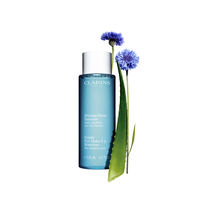Is there a proper way to remove my make-up?
In order to keep skin pure and healthy, the make-up removal process is just as essential and beneficial as every other part of your skin care routine. Sebum, impurities and general build-up caused by pollution and product use can quickly cause skin to look dull and lifeless. Removing eye and face make-up can be effortless and will keep you feeling fresh and on top of your skin’s appearance. Be sure to remove make-up in the evening and start each day off with a proper cleansing method.
Select a make-up remover that suits your skin
Whether you have dry, oily, sensitive skin or combination skin, this affects which make-up remover you choose and some will be used with, make-up removal milk, cream, in a gel form, or require water. The process of make-up removal should require minimal effort and should be satisfying. Selecting a remover that works best on your skin is key. For sensitive skin use a gentle make-up remover.

Be gentle when removing eye make-up
The most important thing to remember when removing make-up is to take care not to irritate or harm the skin around the eyes. The eye contour is a constant repository for make-up, and is one of the most delicate and active areas. This area is vulnerable to damage from pulling and rubbing. Gently swipe the make-up remover over your eye make-up with a cotton lpad. For sensitive skins types, or for light make-up wearers, there is the Gentle Eye Make-Up Remover. For long-lasting make-up, the bi-phase textured product works best. There is also an instant make-up remover for those on-the-go moments when there is limited time to dedicate to the process.
Articles on the same category
1 A Guide to the Best Anti-Aging Skin Care
2 How do serums work?
3 Which anti-wrinkle products counter the visible signs of hormonal changes on the skin?
4 How should a serum be used to optimize its effects?
5 What does “Vegan-Friendly” mean?
6 Which skin care routine should I use in my 20s?
7 When should I use My Clarins products?
8 What is Anti-Pollution Skincare?
9 What is Natural Spot Treatment?
10 Should Cream, Bi-Phase Serum and the HydraQuench mask be used together for optimal moisturising?
11 Is skin care the same for contact lens wearers?
12 How can I make sure that my skin is adequately moisturised?
13 Why use hazelnut oil as a base for essential oils- what are the benefits?
14 Is there a proper way to remove my make-up?
15 Why is the Super Restorative Day Cream so effective in combating wrinkles?
16 An anti-wrinkle treatment specifically for the neck and décolleté?
17 When should I moisturise my skin?
18 My skin is shiny, what should I do?
19 Is there a cream for my age group?
20 When should I start using anti-wrinkle cream?
21 Reducing the appearance of wrinkles
22 Which eye-care products should I use around the eyes?
23 How to reduce bags under the eyes
24 Facial skincare beauty advice
25 How to hide and conceal acne
26 How to prevent and minimise the appearance of dark marks
27 Give your face a non-surgical ‘lift’
28 How to soothe dry lips
29 Choosing the right serum
30 How to cleanse and care for oily skin
31 How can I determine my skin type? Do I have oily skin?
32 How to achieve a natural-looking complexion
33 Which oil is good for skin tightening?
34 Are toners really necessary?
35 There an essential oil suited for every skin type?
36 How do I get rid of wrinkles?
37 How do I treat smile lines & wrinkles?
38 How to reduce dark circles under eyes
39 How to apply eye cream
40 Clarins’ guide to exfoliating your face
41 Clarins’ guide to face masks
42 Which face mask should I use for my skin type?
43 The 6 Best Essential Oils For Your Skin
- < Return to FAQ

